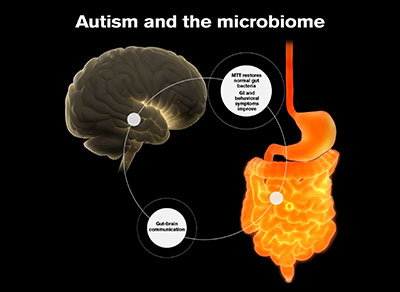An altered bacteria profile in the gut is linked to behaviours that challenge in autism, a new study has found.
The researchers discovered that differences in gut bacteria were “significantly” associated with “thought problems, delinquent behaviours, self dysregulation, and somatic (body pain) complaints”.

The link between the gut and the brain in autism and how researchers at Arizona State University found microbiota transfer therapy, or faecal transplants, helped. Image by Shireen Dooling
They also found that those with autism, compared to typically developing children and youngsters, “had worse GI (gastrointestinal) symptoms”.
However, to complicate the results, they “did not find an association between gut symptoms” and an imbalance in gut bacteria.
‘Complex relationship’
The Taiwanese team, led by Dr Susan Shur-Fen Gau, assessed 82 autistic boys and young men. Also in the study were 31 typically developing children and young adults. All the participants were between the ages of six and 25.
The researchers found that those on the autism spectrum had increases in some bacteria and decreases in others.
They believe their work supports the idea of a “complex relationship” between an altered bacteria profile in the gut, immune dysregulation and autism.
They maintain their work could “advance the discovery of molecular biomarkers” for autism.
Other research on gut issues and altered bacteria
Other research has pointed to the role of the immune system or immune dysregulation in autism. It has found inflammation and autoantibodies in the brain.
Biomedical charity Thinking Autism said it was surprised by the lack of a link between gut problems and altered bacteria in the gut.
But in a statement, the charity said the findings support other research. It said the other research “points to a possible link between the microbiome, immune dysregulation, and autism, and which could potentially lead to much-needed treatments”.
Gut health research
The charity highlighted how work by researchers at Arizona State University to improve gut health in children on the autism spectrum through faecal (poo) transplants led to a 45 per cent reduction in core symptoms after two years.
The new research appears in the November edition of Brain, Behaviour and Immunity.
Related:
- Study seeks proof of gut link to autism
- Evidence grows for autism link to gut
- Study reinforces role of gut health
- Food enzyme tested as autism treatment
- Study finds faecal transplants effective
Published: 17 September 2022















